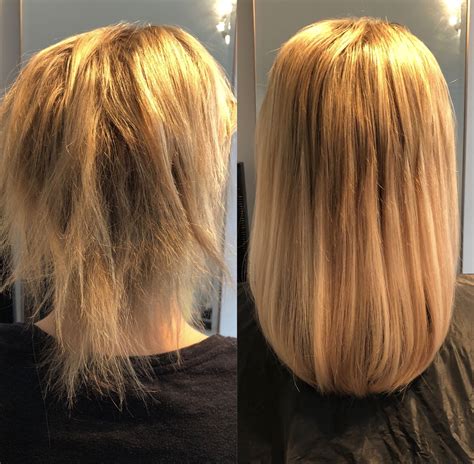Thinning hair is a common problem that affects both men and women. There are many causes of thinning hair, including genetics, hormonal changes, and certain medical conditions. While there is no cure for thinning hair, there are a number of treatments that can help to slow down the process and improve the appearance of your hair.

One popular treatment for thinning hair is hair extensions. Hair extensions can be used to add volume and thickness to your hair, making it appear fuller and healthier. However, it is important to note that hair extensions can also damage your natural hair if they are not applied properly.
There are a number of ways that hair extensions can damage your natural hair. These include:
- Pulling: Hair extensions can put stress on your natural hair, causing it to break or fall out. This is especially true if the extensions are too heavy or if they are not applied properly.
- Tangling: Hair extensions can get tangled in your natural hair, which can lead to breakage and hair loss. This is especially true if the extensions are not brushed regularly.
- Chemical damage: Some types of hair extensions use chemicals to attach them to your natural hair. These chemicals can damage your hair, causing it to become dry, brittle, and prone to breakage.
There are a number of different types of hair extensions available, and some are more likely to damage your natural hair than others. The following types of hair extensions are known to cause the most damage:
- Clip-in extensions: Clip-in extensions are a popular type of hair extension because they are easy to apply and remove. However, they can also be quite damaging to your natural hair, as they can put a lot of stress on your hair strands.
- Glue-in extensions: Glue-in extensions are another type of popular hair extension. They are applied using a strong adhesive, which can damage your hair if it is not removed properly.
- Sew-in extensions: Sew-in extensions are a type of permanent hair extension that is sewn into your natural hair. This type of extension is very damaging to your hair, as it can cause your hair to break or fall out.
If you are concerned about the potential damage that hair extensions can cause to your natural hair, there are a number of other options available to you. These include:
- Minoxidil: Minoxidil is a topical medication that is used to treat hair loss. It works by stimulating hair growth and increasing the thickness of your hair shafts.
- Finasteride: Finasteride is a prescription medication that is used to treat hair loss in men. It works by blocking the production of DHT, a hormone that can cause hair loss.
- Low-level laser therapy: Low-level laser therapy is a treatment that uses low-level lasers to stimulate hair growth. It is a safe and effective treatment for hair loss, and it can help to improve the appearance of your hair.
If you are considering getting hair extensions, it is important to choose the right type of extensions for your hair. The following factors should be considered when choosing hair extensions:
- Your hair type: The type of hair extensions that you choose will depend on your hair type. If you have fine hair, you will need to choose extensions that are lightweight and will not put too much stress on your hair. If you have thick hair, you can choose extensions that are heavier and will add more volume to your hair.
- Your hair length: The length of your hair will also determine the type of extensions that you choose. If you have short hair, you will need to choose extensions that are shorter in length. If you have long hair, you can choose extensions that are longer in length.
- Your budget: The cost of hair extensions can vary depending on the type of extensions that you choose. It is important to set a budget before you start shopping for extensions.
Once you have chosen the right hair extensions, it is important to apply them properly. The following steps should be followed when applying hair extensions:
- Wash and dry your hair.
- Brush your hair to remove any tangles.
- Section your hair into small, even sections.
- Apply the extensions to your hair, starting at the roots.
- Secure the extensions using the appropriate method (clip-in, glue-in, or sew-in).
- Style your hair as desired.
Once you have applied hair extensions, it is important to care for them properly. The following tips will help you to keep your hair extensions looking their best:
- Brush your hair extensions regularly to remove any tangles.
- Wash your hair extensions every 2-3 weeks using a mild shampoo and conditioner.
- Avoid using heat styling tools on your hair extensions.
- Get your hair extensions professionally styled every 6-8 weeks.
Hair extensions can be a great way to add volume and thickness to your hair. However, it is important to choose the right type of extensions for your hair and to apply them properly. By following the tips in this article, you can help to avoid damaging your natural hair and keep your hair extensions looking their best.
